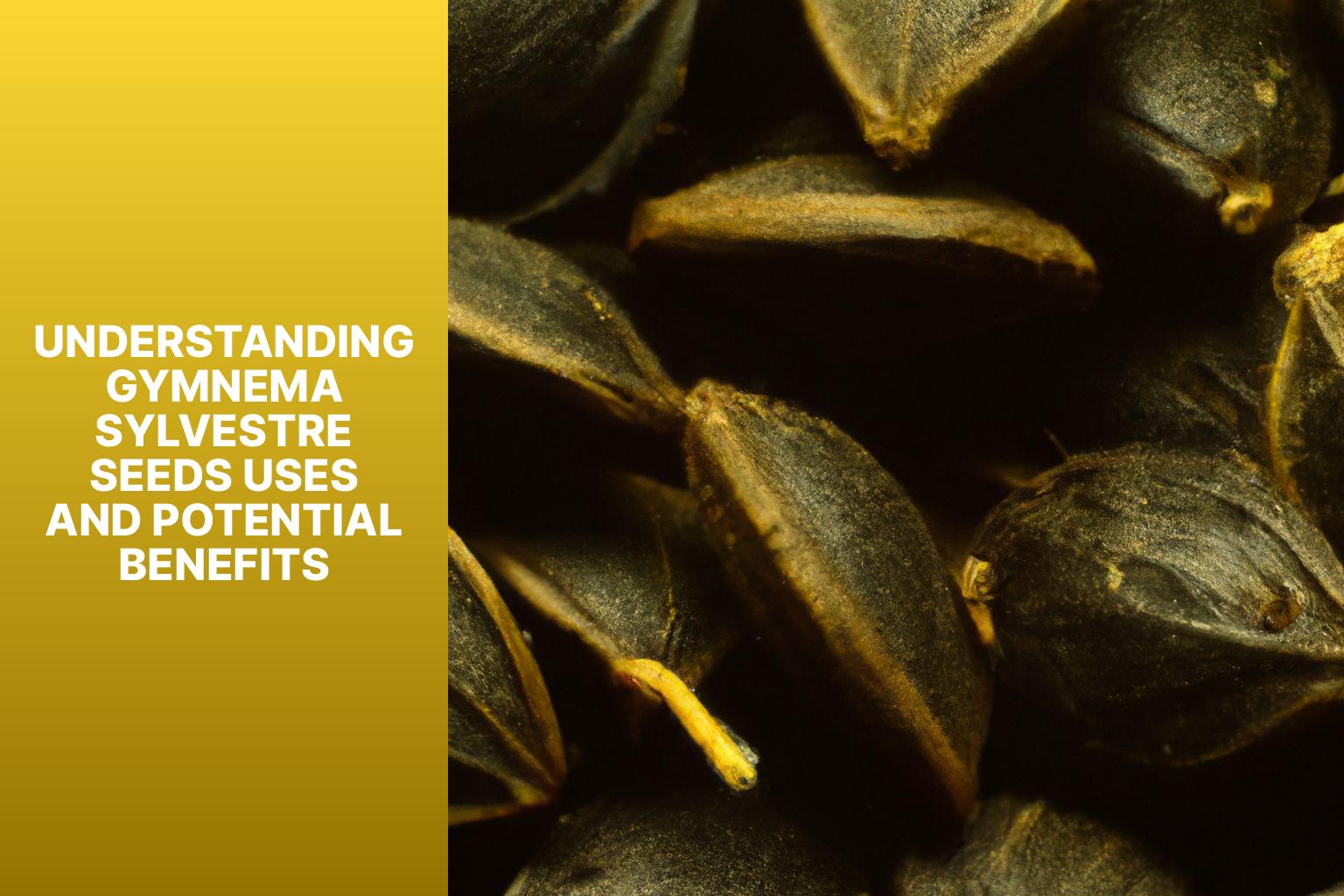Gymnema Sylvestre for Fatty Liver: Improving Liver Health with this Natural Remedy
Gymnema Sylvestre, a herb native to the tropical forests of India, has gained attention for its potential benefits in improving liver health, particularly in cases of fatty liver disease. Fatty liver, also known as hepatic steatosis, is a condition characterized by the buildup of fat in liver cells. It can be caused by factors such as poor diet, obesity, and diabetes or insulin resistance.
In this article, we will explore the relationship between Gymnema Sylvestre and fatty liver. We will delve into the causes of fatty liver and the available treatment options. we will take a closer look at Gymnema Sylvestre, its potential effectiveness in improving liver health, and the evidence supporting its use.
Understanding how Gymnema Sylvestre works is crucial in evaluating its potential benefits. We will discuss its mechanism of action and the recommended dosage for liver health. Furthermore, we will address safety concerns and potential side effects associated with Gymnema Sylvestre.
If you are considering Gymnema Sylvestre as a supplement for your liver health, it is important to be aware of precautions and considerations to make informed decisions about its usage. By exploring the research and evidence surrounding Gymnema Sylvestre, you can gain a better understanding of its potential role in improving liver health and managing fatty liver disease.
1. Gymnema Sylvestre is a natural herb that has been used in traditional medicine for its potential health benefits.
2. Fatty liver is a condition characterized by the build-up of fat in the liver, which can have negative effects on liver health.
3. The main causes of fatty liver include poor diet, obesity, and diabetes or insulin resistance.
4. Treatment options for fatty liver include lifestyle changes, medication, and natural remedies such as Gymnema Sylvestre.
5. Gymnema Sylvestre has shown potential in improving liver health, although more research is needed to confirm its effectiveness.
6. The herb works by reducing liver inflammation and enhancing the liver’s ability to metabolize fats.
7. It is recommended to consult with a healthcare professional for the appropriate dosage of Gymnema Sylvestre.
8. While Gymnema Sylvestre is generally considered safe, some possible side effects and safety concerns may exist.
9. Precautions and considerations should be taken into account, especially for pregnant or breastfeeding women and individuals with certain medical conditions.
What is Fatty Liver?
Fatty liver is a condition characterized by the accumulation of excess fat in the liver cells. It is also known as hepatic steatosis. There are two main types of fatty liver:
- Non-alcoholic Fatty Liver Disease (NAFLD): NAFLD is the most common type of fatty liver and is not related to excessive alcohol consumption. It is often associated with obesity, insulin resistance, metabolic syndrome, and high levels of fat in the blood.
- Alcoholic Fatty Liver Disease (AFLD): AFLD occurs due to excessive alcohol consumption over an extended period. Alcohol is toxic to liver cells, and chronic alcohol abuse can lead to fat accumulation and inflammation in the liver.
Fatty liver can be asymptomatic, and many people may not realize they have it until it progresses to more severe conditions. Some common symptoms may include fatigue, abdominal discomfort, and an enlarged liver.
Without proper management and lifestyle changes, fatty liver can progress to more severe conditions like non-alcoholic steatohepatitis (NASH), liver fibrosis, and ultimately cirrhosis, which is irreversible scarring of the liver.
It is important to consult with a healthcare professional for an accurate diagnosis and appropriate treatment plan if you suspect you have fatty liver or are concerned about your liver health.
Causes of Fatty Liver
When it comes to fatty liver, understanding the underlying causes is crucial. Let’s dive into the different factors that contribute to this condition. From poor dietary choices to the impact of obesity and the significance of diabetes or insulin resistance, each sub-section sheds light on a specific aspect of fatty liver development. Prepare to uncover the intricate web of factors that can lead to this serious health concern.
Poor Diet
A poor diet is one of the main factors contributing to the development of fatty liver. Adopting a healthy dietary pattern is crucial for preventing and managing this condition. Here are some important considerations when it comes to the impact of a poor diet on fatty liver:
Maintaining a healthy diet is essential for preventing and managing fatty liver. By avoiding excessive calorie intake, limiting saturated fats and added sugars, and focusing on whole, unprocessed foods, you can promote the health of your liver and reduce the risk of fatty liver development. Remember, it’s always best to consult with a healthcare professional or registered dietitian for personalized dietary recommendations.
Obesity
Obesity is a significant factor contributing to fatty liver disease, and it is crucial to address this issue to improve liver health. Here are some key points to consider regarding obesity and its impact on fatty liver:
-
Obesity and fatty liver: Obesity is closely linked to the development of fatty liver disease. Excess body weight, particularly in the abdominal area, can lead to the accumulation of fat in the liver cells. This buildup of fat can impair liver function and lead to inflammation.
-
Increase in liver fat: Obesity can lead to an increase in the amount of fat stored in the liver. Research has shown that overweight and obese individuals are more likely to develop fatty liver disease compared to those with a healthy weight.
-
Inflammation and liver damage: Obesity-related fatty liver disease is often associated with inflammation in the liver. This inflammation can damage liver cells and may progress to more severe conditions, such as non-alcoholic steatohepatitis (NASH).
-
Insulin resistance: Obesity is also closely linked to insulin resistance, a condition in which the body’s cells become less responsive to the effects of insulin. Insulin resistance can further contribute to the development and progression of fatty liver disease.
-
Weight loss: Losing weight through a combination of diet and exercise is an essential step in managing obesity-related fatty liver disease. A gradual and sustainable weight loss of 5-10% of body weight can significantly improve liver health.
Addressing obesity is crucial for the management and prevention of fatty liver disease. A healthy lifestyle, including a balanced diet and regular physical activity, can help reduce excess body weight and improve liver health. Consulting with a healthcare professional can provide further guidance and support in managing obesity-related fatty liver disease.
Diabetes or Insulin Resistance
| Diabetes | Insulin Resistance |
| When it comes to fatty liver, diabetes or insulin resistance can have a significant impact on its development and progression. Let’s take a closer look at how these conditions contribute to fatty liver and what can be done to manage them. | Diabetes is a chronic condition characterized by high levels of blood glucose. Insulin resistance refers to a condition where the body’s cells do not respond properly to the hormone insulin. |
| Uncontrolled diabetes can lead to the accumulation of excess fat in the liver. | Insulin resistance increases the risk of fatty liver by promoting the deposition of fat in the liver. |
| Elevated blood glucose levels in diabetes can stimulate the liver to produce more fat, leading to increased fat accumulation in the liver. | Insulin resistance disrupts the normal breakdown and storage of fats in the liver, resulting in the buildup of fat. |
| People with diabetes are more likely to develop non-alcoholic fatty liver disease (NAFLD). | Insulin resistance is strongly associated with the development and progression of NAFLD. |
| Managing diabetes through blood glucose control is essential for preventing and managing fatty liver. | Improving insulin sensitivity through lifestyle changes, such as exercise and a healthy diet, can help reduce the progression of fatty liver in insulin-resistant individuals. |
It is crucial for individuals with diabetes or insulin resistance to take steps to manage their condition and reduce the risk of fatty liver. This includes following a balanced diet, engaging in regular physical activity, and working closely with healthcare professionals to optimize diabetes management.
By understanding the link between diabetes or insulin resistance and fatty liver, individuals can make informed decisions to improve their liver health and overall well-being.
Treatment Options for Fatty Liver
When it comes to treating fatty liver, there are several options available:
- Lifestyle Modifications: Making significant changes to your lifestyle can have a positive impact on fatty liver. This includes maintaining a healthy diet, exercising regularly, losing weight if needed, and avoiding alcohol consumption.
- Dietary Changes: Focus on a balanced diet that is low in saturated fats, trans fats, and refined sugars. Increase your intake of fruits, vegetables, whole grains, and lean proteins. Consider incorporating foods known for their liver-protective properties, such as green tea, coffee, and foods high in omega-3 fatty acids.
- Medication: In some cases, doctors may prescribe medications to help manage fatty liver. These medications may include vitamin E, pioglitazone, or statins, depending on the underlying causes and associated conditions.
- Herbal Remedies: Certain herbal remedies, such as Gymnema Sylvestre, have been studied for their potential benefits in improving liver health. It’s important to consult with a healthcare professional before using any herbal supplements to ensure safety and efficacy.
- Management of Underlying Conditions: If fatty liver is caused by underlying conditions like obesity, diabetes, or high cholesterol, it is essential to manage and treat these conditions effectively. This may involve medication, lifestyle changes, or a combination of both.
- Regular Monitoring: Regular check-ups and monitoring of liver function through blood tests can help track the progress of fatty liver and determine the effectiveness of the chosen treatment options.
It is crucial to consult with a healthcare professional or a specialist in liver diseases to determine the most suitable treatment approach for your specific case of fatty liver.
What is Gymnema Sylvestre?
Gymnema Sylvestre is a herb that is native to the tropical regions of India, Africa, and Australia. It has been used for centuries in traditional medicine, particularly in Ayurveda, for its potential health benefits.
Here are some key characteristics of Gymnema Sylvestre:
- Botanical Name: Gymnema Sylvestre
- Common Names: Gurmar, Meshasringi, Miracle Fruit
- Physical Appearance: Gymnema Sylvestre is a woody climbing plant with oval-shaped leaves. It produces small yellow flowers and elongated fruits.
- Active Compounds: The herb contains several bioactive compounds, including gymnemic acids, which are believed to be responsible for its potential health effects.
- Health Benefits: Gymnema Sylvestre is commonly associated with blood sugar management and is often used in traditional medicine to support healthy blood glucose levels. It is also believed to have anti-inflammatory and antioxidant properties.
- Traditional Uses: In traditional medicine, Gymnema Sylvestre has been used for various purposes, including weight management, digestive support, appetite suppression, and the promotion of healthy liver function.
While Gymnema Sylvestre shows promise in various areas of health, it is important to note that scientific research is ongoing, and the specific effects and mechanisms of action are still being explored. Before using Gymnema Sylvestre or any other herbal supplement for medicinal purposes, it is advisable to consult with a healthcare professional.
Can Gymnema Sylvestre Help Improve Liver Health?
Can Gymnema Sylvestre be the secret to improving liver health? Let’s uncover the potential benefits of this natural remedy in our quest for a healthier liver. In this section, we’ll dive into the evidence of Gymnema Sylvestre’s effectiveness, exploring how it may support liver function and contribute to overall well-being. So, if you’re interested in discovering a natural solution for a fatty liver, join us as we explore the promising possibilities of Gymnema Sylvestre.
Evidence of Gymnema Sylvestre’s Effectiveness
Evidence suggests that Gymnema Sylvestre’s effectiveness in improving liver health is supported by various studies. The following points provide an overview of the evidence supporting Gymnema Sylvestre’s effectiveness in promoting liver health:
- Liver enzyme levels: Studies have shown that Gymnema Sylvestre supplementation can help reduce elevated liver enzyme levels, such as alanine aminotransferase (ALT) and aspartate aminotransferase (AST). The reduction in these enzymes indicates an improvement in liver health, providing evidence of Gymnema Sylvestre’s effectiveness.
- Anti-inflammatory properties: Gymnema Sylvestre’s anti-inflammatory properties can be beneficial for liver health. Chronic inflammation can lead to liver damage and fatty liver disease. By reducing inflammation in the liver, Gymnema Sylvestre contributes to the improvement of liver health, providing evidence of its effectiveness.
- Antioxidant activity: The active compounds present in Gymnema Sylvestre, such as gymnemic acids and flavonoids, exhibit strong antioxidant activity. These antioxidants protect liver cells from oxidative stress and damage caused by free radicals. This evidence suggests that Gymnema Sylvestre’s antioxidant activity contributes to the improvement of liver health.
- Fatty liver disease: Research suggests that Gymnema Sylvestre is effective in reducing fat accumulation in the liver and preventing or managing fatty liver disease. It inhibits fat synthesis and promotes fat breakdown, preventing the deposition of fat in liver cells. This evidence supports Gymnema Sylvestre’s effectiveness in preventing fatty liver disease.
- Blood lipid levels: Gymnema Sylvestre has a positive impact on blood lipid levels, including cholesterol and triglycerides. High levels of these lipids can contribute to liver damage and fatty liver. By regulating lipid levels, Gymnema Sylvestre helps improve liver health, providing evidence of its effectiveness.
Evidence suggests that Gymnema Sylvestre’s effectiveness in enhancing liver health is supported by research findings. It can reduce liver enzyme levels, possess anti-inflammatory and antioxidant properties, prevent fatty liver disease, and regulate blood lipid levels. Incorporating Gymnema Sylvestre as part of a healthy lifestyle and under professional guidance may provide potential benefits for individuals looking to improve their liver health.
Historically, Gymnema Sylvestre has been used in Ayurvedic medicine for centuries. Its traditional use in India for various health conditions, including liver ailments, highlights its reputation as a medicinal plant. The scientific evidence supporting its effectiveness in promoting liver health validates the traditional wisdom surrounding Gymnema Sylvestre. Further insights into its mechanisms of action and potential benefits for liver health may be uncovered as researchers continue to study this plant.
How Does Gymnema Sylvestre Work?

Photo Credits: Diabetescompass.Com by Dylan Green
Gymnema Sylvestre is believed to work in several ways to potentially improve liver health:
- Blood Sugar Regulation: Gymnema Sylvestre has been traditionally used for its ability to regulate blood sugar levels. By reducing blood sugar spikes, it may help prevent the accumulation of fat in the liver, which is a common cause of fatty liver disease.
- Anti-Inflammatory Effects: Studies suggest that Gymnema Sylvestre possesses anti-inflammatory properties. Chronic inflammation in the liver can contribute to liver damage and the progression of liver diseases. By reducing inflammation, Gymnema Sylvestre may help protect liver cells and promote overall liver health.
- Antioxidant Activity: Gymnema Sylvestre is rich in antioxidants, compounds that help neutralize harmful free radicals in the body. Free radicals can damage liver cells and contribute to liver diseases. The antioxidant activity of Gymnema Sylvestre may help reduce oxidative stress in the liver and support its proper functioning.
- Lipid Metabolism: Some research suggests that Gymnema Sylvestre may influence lipid metabolism, which is the process by which the liver breaks down fats. By promoting healthy lipid metabolism, Gymnema Sylvestre may potentially reduce the accumulation of fat in the liver and improve liver health.
- Enhanced Insulin Sensitivity: Gymnema Sylvestre may help improve insulin sensitivity, which is important for managing blood sugar levels. By enhancing insulin sensitivity, it may support the proper functioning of the liver and help prevent conditions like fatty liver disease.
While there is some evidence to support the potential benefits of Gymnema Sylvestre for liver health, further research is needed to fully understand its mechanisms of action and to determine its effectiveness in treating liver conditions. It is always advisable to consult with a healthcare professional before starting any new supplement or treatment for liver health.
Recommended Dosage of Gymnema Sylvestre
The recommended dosage of Gymnema Sylvestre for various purposes may vary depending on factors such as the individual’s age, overall health, and the specific formulation of the supplement. Here are some general guidelines:
- Blood Sugar Control: For individuals looking to manage blood sugar levels, a common dosage range is 200-400 milligrams of Gymnema Sylvestre extract per day. This can be split into two or three doses.
- Weight Management: When using Gymnema Sylvestre as a part of a weight management regimen, a similar dosage of 200-400 milligrams per day is often recommended. It is advisable to consult a healthcare professional to determine the appropriate dosage for your specific needs.
- Liver Health: In the context of improving liver health, there is no specific recommended dosage for Gymnema Sylvestre. Clinical studies investigating its effects on liver health have used dosages ranging from 200-400 milligrams per day. Further research is needed to determine the optimal dosage for liver-related conditions.
It is important to note that individual responses may vary, and it is always best to consult with a healthcare professional or a qualified herbalist before starting any new supplement regimen. They can provide personalized guidance based on your specific health needs and considerations.
Possible Side Effects and Safety Concerns

Photo Credits: Diabetescompass.Com by Mason Johnson
While Gymnema Sylvestre may offer potential benefits for fatty liver and liver health, it is essential to be aware of possible side effects and safety concerns:
- Hypoglycemia: Gymnema Sylvestre has the ability to lower blood sugar levels. Individuals with diabetes or those taking medications to lower blood sugar should use caution and monitor their glucose levels closely.
- Gastrointestinal Disturbances: Some people may experience digestive issues such as stomach upset, diarrhea, or nausea when taking Gymnema Sylvestre. If these symptoms occur, it is advisable to discontinue use and consult a healthcare professional.
- Allergic Reactions: Although rare, allergic reactions to Gymnema Sylvestre can occur. If any signs of an allergic reaction, such as rash, itching, or swelling, are experienced, immediate medical attention should be sought.
- Interactions with Medications: Gymnema Sylvestre may interact with certain medications, including those used for diabetes, blood thinners, or medications that affect the liver. It is crucial to consult with a healthcare professional before incorporating Gymnema Sylvestre into your routine.
- Pregnancy and Breastfeeding: There is limited research on the safety of Gymnema Sylvestre during pregnancy and breastfeeding. It is recommended to avoid its use during these periods to ensure the well-being of both the mother and child.
- Individual Variations: Each person’s body and health conditions are unique. It is possible that some individuals may experience side effects or have specific safety concerns that are not commonly reported. Consulting with a healthcare professional is advisable before using Gymnema Sylvestre.
While Gymnema Sylvestre shows promise as a natural remedy for fatty liver and liver health, it is important to prioritize safety and consult with a healthcare professional to determine if it is appropriate for your specific situation.
Precautions and Considerations
Before using Gymnema Sylvestre for fatty liver or any other health condition, it is important to take the following precautions and considerations into account:
- Consult with a Healthcare Professional: It is always advisable to consult with a qualified healthcare professional before starting any new supplement or herbal remedy. They can provide personalized advice based on your specific health condition and medical history.
- Understand Potential Interactions: Gymnema Sylvestre may interact with certain medications, such as those for diabetes or blood sugar control. It is essential to inform your healthcare provider about all the medications you are currently taking to avoid any potential adverse effects or interactions.
- Proper Dosage and Administration: Follow the recommended dosage instructions provided by the manufacturer or your healthcare professional. Taking excessive amounts of any supplement can have negative effects on your health.
- Monitor Blood Sugar Levels: If you have diabetes or are taking medications that affect blood sugar levels, closely monitor your blood sugar levels while using Gymnema Sylvestre. Adjustments to your medication may be necessary to prevent hypoglycemia.
- Pregnancy and Breastfeeding: The safety of Gymnema Sylvestre during pregnancy and breastfeeding has not been established. It is best to avoid using it during these periods unless specifically recommended by a healthcare professional.
- Quality and Source: Ensure that you are purchasing Gymnema Sylvestre from a reputable source that follows quality control standards. This helps to minimize the risk of contaminants and ensures that the product contains the specified ingredients in the correct amounts.
- Adherence to Instructions: Follow the instructions regarding the duration of use and any recommended breaks or cycles. Prolonged or excessive use of herbal supplements may have unintended consequences.
- Individual Variations: Keep in mind that everyone’s body may respond differently to herbal remedies. What works for one person may not work for another. It is important to listen to your body and discontinue use if you experience any adverse reactions.
Remember, Gymnema Sylvestre should not be used as a substitute for medical treatment or professional advice. It is always best to consult with a healthcare professional to determine the most appropriate approach for improving liver health or managing any health condition.
Gymnema Sylvestre for Fatty Liver: Can It Help Improve Liver Health?
- ✅ Gymnema Sylvestre is a plant used in Ayurveda, a form of holistic medicine. (Source: Verywell Health)
- ✅ It is found in tropical regions of India, Africa, and Australia. (Source: Verywell Health)
- ✅ Gymnema Sylvestre contains gymnemic acid, which suppresses the taste of sugar. (Source: Verywell Health)
- ✅ It is believed to block the absorption of sugar and fat in the body, potentially helping with obesity and high cholesterol. (Source: Verywell Health)
- ✅ Gymnema Sylvestre may increase insulin production in the pancreas and improve blood sugar levels in people with diabetes. (Source: Verywell Health)
Frequently Asked Questions
1. Can Gymnema Sylvestre help improve liver health in individuals with fatty liver disease?
Gymnema Sylvestre has shown potential in improving liver health, particularly in individuals with fatty liver disease. It has been found to reduce liver fat accumulation and improve insulin resistance, which can contribute to the progression of the disease.
2. Can Gymnema Sylvestre limit fruit intake for individuals with fatty liver disease?
No, Gymnema Sylvestre does not limit fruit intake. It primarily works by suppressing the taste of sugar and reducing cravings for high-sugar foods. However, it is important to follow a balanced diet and consult with a healthcare provider for personalized dietary recommendations.
3. Is there a link between Gymnema Sylvestre and hepatocellular cancer?
There is no known direct link between Gymnema Sylvestre and hepatocellular cancer. Gymnema Sylvestre is commonly used for its potential antidiabetic effects and is not associated with an increased risk of liver cancer.
4. Is Gymnema Sylvestre effective in treating aplastic anemia?
Gymnema Sylvestre has not been extensively studied as a treatment for aplastic anemia. Its primary use and research focus have been on its potential benefits in diabetes management and liver health.
5. How does Gymnema Sylvestre relate to type 2 diabetes mellitus?
Gymnema Sylvestre has shown promising results in managing type 2 diabetes mellitus. It may stimulate insulin production in the pancreas and reduce the absorption of sugar in the intestines, leading to improved blood sugar control in individuals with diabetes.
6. Can Gymnema Sylvestre interact with oral or injectable medications?
There is a possibility of interactions between Gymnema Sylvestre and certain medications. It is important to consult with a healthcare provider or pharmacist before starting Gymnema Sylvestre supplementation to ensure there are no potential drug interactions.







